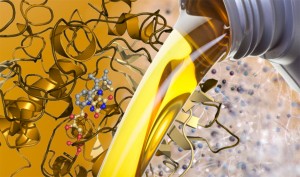Finding new routes to biofuels: a biochemical exploration
Professor David Leys, Faculty of Life Sciences, University of Manchester
One of the main challenges our society faces is the dwindling level of oil reserv es. We not only depend upon these for transport fuels, but also plastics, lubricants and a wide range of petrochemicals. Solutions that seek to reduce our dependency on fossil oil are therefore urgently needed. Modern approaches seek to provide an answer through synthetic biology: making organisms produce ‘oil’. The direct production of hydrocarbon compounds by living organisms is an attractive process, but it is unfortunately not part of the ‘mainstream’ repertoire of biochemical reactions. Indeed, minor pathways or side-reactions resulting in the production of small quantities of hydrocarbons such as alkenes or alkanes have only recently been documented. Unfortunately, these are not present in any organism to the scale and/or specificity that would support industrial application, let alone provide a valid alternative to fossil oil. However, the application of synthetic biology and metabolic engineering to modify these pathways is likely to result in innovative advances in this area.
es. We not only depend upon these for transport fuels, but also plastics, lubricants and a wide range of petrochemicals. Solutions that seek to reduce our dependency on fossil oil are therefore urgently needed. Modern approaches seek to provide an answer through synthetic biology: making organisms produce ‘oil’. The direct production of hydrocarbon compounds by living organisms is an attractive process, but it is unfortunately not part of the ‘mainstream’ repertoire of biochemical reactions. Indeed, minor pathways or side-reactions resulting in the production of small quantities of hydrocarbons such as alkenes or alkanes have only recently been documented. Unfortunately, these are not present in any organism to the scale and/or specificity that would support industrial application, let alone provide a valid alternative to fossil oil. However, the application of synthetic biology and metabolic engineering to modify these pathways is likely to result in innovative advances in this area.
Our group uses state-of-the-art enzymology and structural biology to underpin laboratory evolution techniques aimed at application in synthetic biology. A detailed characterization of the enzymes producing hydrocarbons is revealing new biochemistry, including new enzyme cofactors. For example, our team has investigated in detail the mechanism whereby common yeast mould can produce kerosene-like odours when grown on food containing the preservative sorbic acid. We found that these organisms use a previously unknown modified form of vitamin B2 (flavin) to support the production of volatile hydrocarbons that cause the kerosene smell. Although microbes can only produce very modest amounts of fuel-like compounds through this modified vitamin B2-dependent process, we are now in a much better position to try to improve the yield and nature of the compounds produced.
We will present an overview of the present approaches aimed at direct biological production of hydrocarbons, provide an account of some of our own results in this area, and speculate on the scope and limits of synthetic biology applications in this field.
For further information please contact: Dr. Ian Blomfield, School of Biosciences, University of Kent, Stacey Building, Canterbury, Kent, CT2 7NJ. Tel: 01227 823697.
Wednesday 14th October, 17:00
Woolf Lecture Theatre (https://www.kent.ac.uk/maps/canterbury/canterbury-campus/building/woolf-college)
Free and open to all
